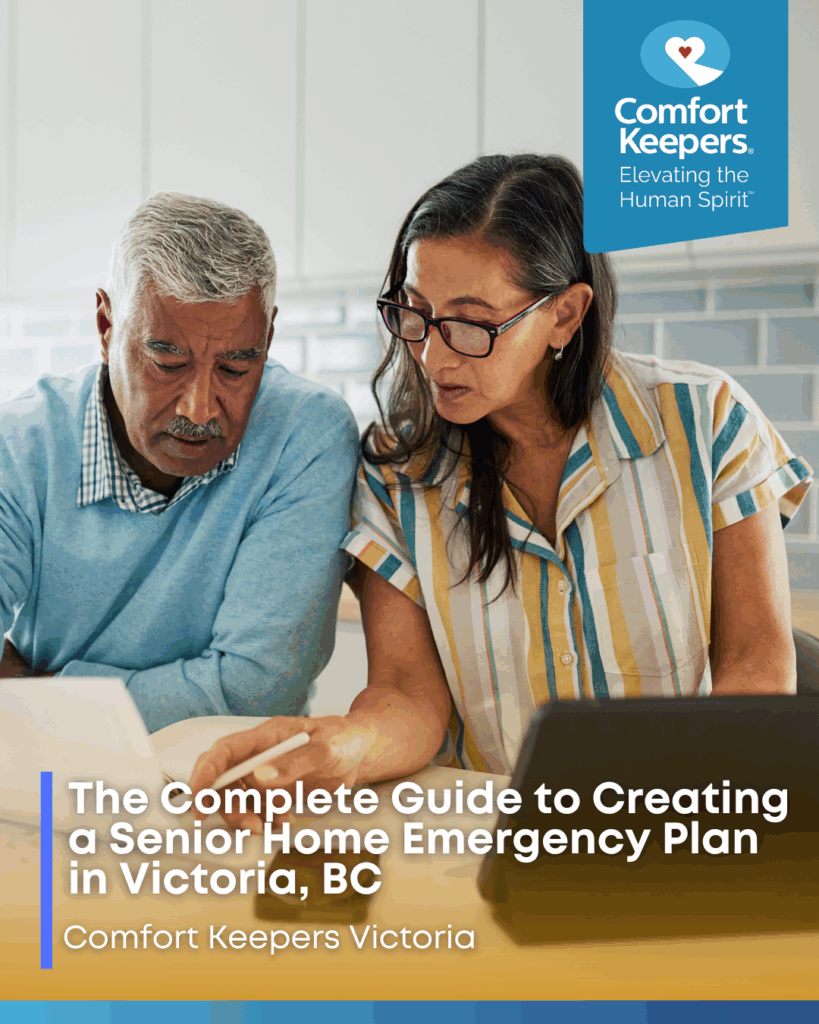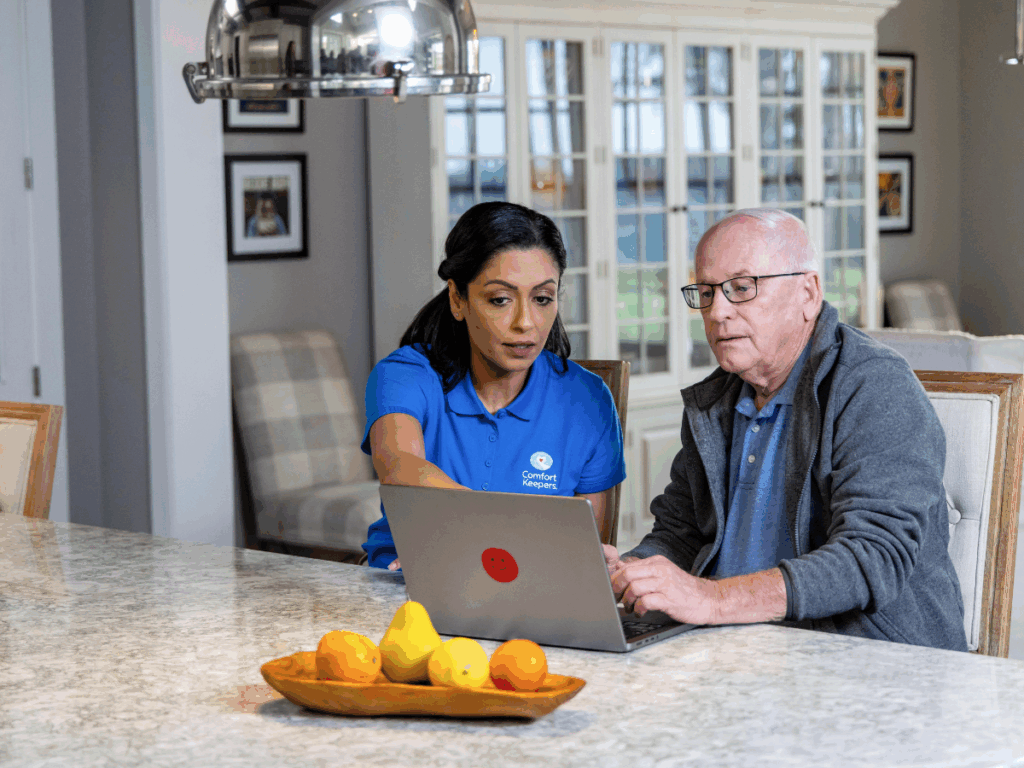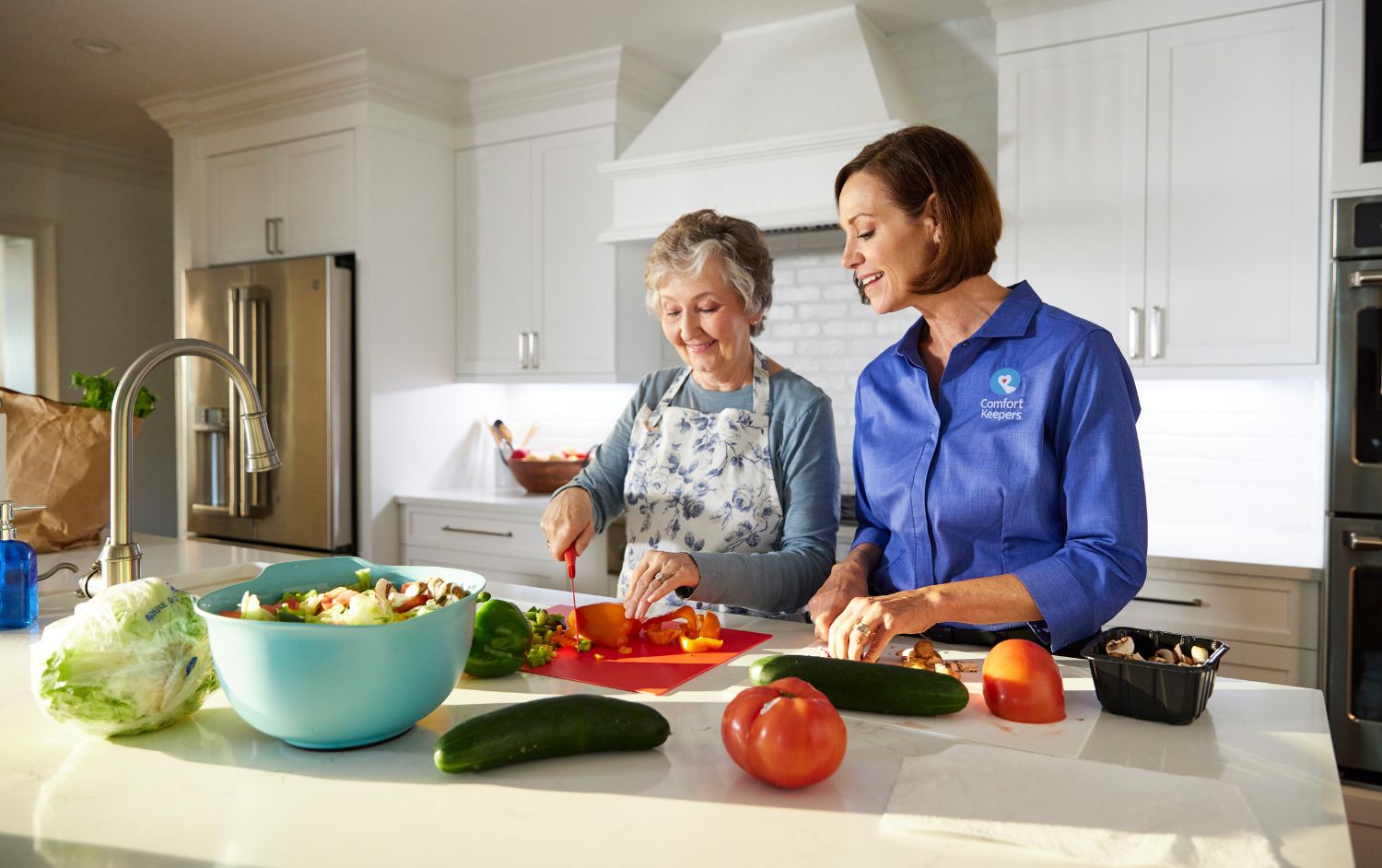The Complete Guide to Creating a Senior Home Emergency Plan in Victoria, BC
Senior Safety | October 21, 2025
As a family member, your peace of mind is directly linked to your loved one’s safety. You’ve likely browsed the official government websites – helpful, but often impersonal and overwhelming. You’ve found checklists and generic advice, but nothing that speaks to the unique reality of helping a senior parent or relative prepare for an emergency in Victoria. You’re not just looking for a plan; you’re looking for a process that brings confidence and calm, not fear.
That’s what this guide is for.
The need for a robust plan is undeniable. With a 26% increase in emergency visits by BC seniors over the past decade, as reported by Office of the Seniors Advocate B.C. (OSA) proactive planning has become essential. This guide moves beyond generic templates to give you a step-by-step framework specifically for Victoria families, addressing the practical steps and the human element that others miss.

The First Step: Starting the Conversation with Confidence
Before you start printing checklists, the most critical step is talking with your loved one. This conversation can be delicate. The key is to frame it as a collaborative effort to maintain their independence, not take it away.
Instead of saying, “We need to make an emergency plan for you,” try:
- “I’m updating our family’s emergency contacts, and I want to make sure we’re all on the same page. Can we work on it together?”
- “After that last storm warning, I realized I wouldn’t know who to call first if we couldn’t reach each other. Let’s make a simple communication plan.”
- “Let’s put a plan in place so you can continue living here, safely and independently, no matter what happens.”
Focus on empowerment. This is about ensuring they have control and support during an unexpected event.
Building Your Family’s Core Emergency Plan: The 4 C’s
A comprehensive plan doesn’t have to be complicated. By focusing on four key areas – Contacts, Communication, Containment, and Checkout – you can cover all the essential bases.
1. Contacts: Your Lifeline in an Emergency
An emergency contact list should be clear, comprehensive, and accessible. It needs to live in multiple places: on the fridge, near the phone, and in their wallet or purse.
Your list must include more than just immediate family. Organize it into tiers:
- Immediate Response Circle:
- Family members (list relationship and phone numbers)
- A trusted, nearby neighbor who can check in physically
- Building manager or superintendent
- Medical Team:
- Family Doctor (include address and phone)
- Specialists (Cardiologist, etc.)
- Local Pharmacy (include address and phone)
- Home care provider (like Comfort Keepers Victoria)
- Victoria-Specific Community & Emergency Contacts:
- Police/Fire/Ambulance: 911
- Victoria Police Non-Emergency: 250-995-7654
- Victoria Fire Dept. Non-Emergency: 250-920-3350
- Island Health General Inquiries: 250-388-2273
- HealthLink BC: 811 (for non-emergency health advice from a registered nurse)
- Victoria Emergency Management Agency (VEMA) for updates
2. Communication: A Clear Plan for Staying Connected
During an emergency, local phone lines can become overwhelmed. A simple communication tree prevents confusion and ensures everyone gets the information they need.
- Establish an Out-of-Province Contact: Designate one relative or friend who lives outside of BC as the central point of contact. It’s often easier to make a long-distance call than a local one during a regional disaster.
- Create a Calling Order: In an emergency, your first call should be to the out-of-province contact to report you are safe. Then, that person becomes the hub, responsible for relaying the message to other family members. This prevents your loved one from being inundated with calls.
- Have a Backup: Decide on a backup communication method, whether it’s text messages, social media, or email.
3. Containment: How to Safely Shelter-in-Place
Many emergencies, like power outages or severe storms, will require your loved one to shelter in place. This means having everything they need to be safe and comfortable at home for up to seven days.
- Designate a “Safe Room”: Choose an interior room with no windows, if possible. Stock it with essentials from the home survival kit.
- Build a 7-Day Home Survival Kit:
- Water: Four litres per person, per day.
- Food: Non-perishable, easy-to-open cans and dried goods.
- Medication: At least a 7-day surplus of all prescription and over-the-counter medications.
- Light & Power: Flashlights, extra batteries, and a battery-powered or crank radio.
- First-Aid Kit: A comprehensive kit including bandages, antiseptic wipes, and any specific medical supplies needed.
- Sanitation: Toilet paper, garbage bags, and moist towelettes.
4. Checkout: Planning a Safe Evacuation
If they need to leave, they must be able to do so quickly.
- Plan Routes: Identify at least two evacuation routes from their home. Walk the routes with them if possible to identify any potential obstacles.
- Designate Meeting Points: Establish two meeting points: one just outside the home (e.g., a neighbour’s driveway) and one outside the neighbourhood (e.g., a local community center or library).
- Prepare a “Grab-and-Go” Bag: This bag should be lightweight and kept somewhere easily accessible, like a front hall closet. It must contain:
- Copies of important documents (ID, prescriptions, powers of attorney)
- A 3-day supply of essential medications and a list of dosages
- Cash in small bills
- The emergency contact list
- A spare pair of glasses and hearing aid batteries
- Snacks and bottled water
Tailoring the Plan for Senior-Specific Needs
Generic plans fail seniors because they don’t account for their unique health and mobility needs. This is where your family’s plan can truly excel.
1. Medication Management
A missed dose of critical medication can turn a manageable situation into a medical emergency.
- Keep a detailed, up-to-date list of all medications, dosages, and prescribing doctors in the Grab-and-Go bag and on the fridge.
- Speak with their pharmacist about safely obtaining a small surplus for the emergency kit.
- Include the pharmacy’s phone number on the contact sheet for emergency refills.
2. Addressing Mobility Challenges
With 1 in 3 British Columbians over 65 experiencing a fall each year, mobility is a critical safety factor.
- Ensure evacuation routes are clear of clutter and accessible for walkers or wheelchairs.
- If they live in an apartment, have a clear plan for evacuating without using an elevator. This may involve coordinating with building management or neighbours.
- Consider how mobility aids (canes, walkers) will be transported during an evacuation. Our in-home care services often include a thorough home safety assessment to identify and mitigate these risks.
3. Cognitive Considerations
For seniors with dementia or memory issues, a complex plan can be confusing.
- Keep the plan simple and visual. Use pictures or large-print text for key instructions.
- Place important information (like the contact list) in highly visible areas they see every day.
- Practice simple steps, like locking the door and meeting at the end of the driveway, more frequently.
4. Integrating Modern Technology for Enhanced Safety
Technology can be a powerful ally in senior safety. With over 70% of seniors open to using smart tech, these tools are more accessible than ever.
- Vic-Alert: Ensure your loved one is signed up for Vic-Alert, the city’s official emergency notification system. You can register their phone number and address to receive critical local alerts.
- Medical Alert Systems: Devices with fall detection can provide a direct line to emergency services, offering immense peace of mind for both of you.
- Smart Speakers: A simple voice command can be used to “call my daughter” or “call 911” in a hands-free environment, which is vital after a fall.

The Family’s Role: Bringing the Plan to Life
A plan on paper is only a starting point. Your role as the family coordinator is to make it a living document.
- Assign Roles: If you have siblings or other relatives involved, give everyone a specific job. One person can be in charge of checking on medications, while another handles the annual plan review.
- Practice, Don’t Panic: Once a year, walk through the plan. You don’t need a full-scale drill, but reviewing the steps keeps it fresh. Where is the Grab-and-Go bag? Who is the out-of-province contact?
- Review Annually: Health conditions, medications, and contact numbers change. Schedule an annual review to update the plan and kits. This ensures the plan remains relevant and effective when it’s needed most. As a family caregiver, managing these details can be a lot; sometimes, having a professional can provide the support you need to focus on these important tasks.
Frequently Asked Questions (FAQ)
Q: My parent is resistant to planning. What else can I do?
A: Start small. Focus on one piece of the plan, like updating their contact list or preparing a small emergency kit for their car. Frame it as something you are doing for the whole family. Success in one small area can build confidence and make them more receptive to bigger steps.
Q: What are the most important items for a senior’s emergency kit?
A: Beyond the basics of food and water, the absolute non-negotiables are a 7-day supply of all prescription medications, a detailed list of those medications and dosages, a copy of their ID and prescriptions, and spare batteries for hearing aids or other medical devices.
Q: How can in-home care support an emergency plan?
A: Professional caregivers are a crucial part of a senior’s safety net. At Comfort Keepers Victoria, our caregivers can help maintain emergency kits, ensure contact lists are current, identify and remove in-home hazards, and provide immediate assistance and companionship during a shelter-in-place event. They become a familiar, trusted presence who understands the plan.
Gain True Peace of Mind with a Partner in Care
Creating this plan is a profound act of love and one of the most important things you can do for your family. You’ve taken the first step by seeking out the best information to protect your loved one.
At Comfort Keepers Victoria, we see ourselves as an extension of your family’s support system. Our personalized approach to in-home care is built on the same principles as a great emergency plan: it’s proactive, it’s tailored to the individual, and its goal is to empower seniors to live safely and independently in the comfort of their own homes.
If you would like to discuss how a professional caregiver can be integrated into your loved one’s safety plan, contact us for a complimentary and no-obligation in-home consultation. Let’s build a complete circle of support together.
The Best Senior Home Care Provider in Victoria, BC, is Comfort Keepers®
Firstly, if you are concerned about the health and well-being of your aging loved ones, we can help with 24-hour care. We offer senior care, post-surgery care, palliative care, personal care, senior living transition services, and much more!
Comfort Keepers® Victoria Provides In-Home Elderly Care Services
Aging in place means keeping seniors happy and healthy at home. Comfort Keepers® trained caregivers provide seniors with the highest quality of life possible. In particular, our Interactive Caregiving™ system provides care that addresses safety, nutrition, mind, body, and activities of daily living.
Comfort Keepers® Victoria In-Home Caregivers Can Help with Interactive Caregiving™
Personal and empathetic care starts in the heart and allows us to meet our clients’ needs. Our philosophy is to elevate the human spirit. Our caregivers will be there every step of the way to ensure your loved one has a better quality of life.
Senior Homecare in Victoria, BC
Our unique services offer families respite care, overnight care, personal care, companionship care, palliative care, and end-of-life care. To learn more, contact the Comfort Keepers Victoria office.
Comfort Keepers® Victoria is Proud to Provide Senior Care and Home Care Services to Keep Seniors Safe in Their Homes
If you are searching for home care near you, we can help! Comfort Keepers® Victoria can provide home care for Victoria and surrounding areas. Service territory includes Colwood, Saanich, Sidney, James Bay, and Oak Bay. Please call (778) 265-5999 and learn how your loved ones can receive compassionate, professional in-home care.
Quality and Accredited Respite Care for British Columbia Families
Comfort Keepers® Victoria has achieved Exemplary Standing accreditation from Accreditation Canada. This accreditation, a rigorous evaluation of organizational processes, policies, and procedures against established quality standards by industry experts, signifies that Comfort Keepers’ offices have successfully met or surpassed the stringent benchmarks for Home Care companies as defined by Accreditation Canada.
Individualized Home Care Options
Long-Term Home Care, 24 Hour Home Care & Short Term Care Options Customized for You






